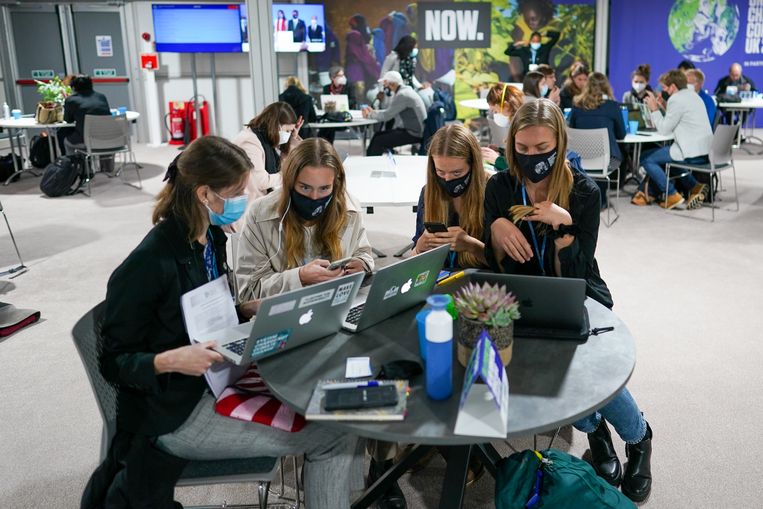With only a few days left, chaos reigns in Glasgow at the moment. But top climate experts are keeping their spirits up and hope the “unshakeable ambition” to save the climate will remain skillful at negotiators.
The hopeful thing in chaos theory is that behind apparent chaos hides a system that leads to results in an orderly fashion. It is a final reference point for participants at this week’s Climate Summit in Glasgow, where chaos reigns and the prospect of success is still a long way off.
More than 40,000 people have been accredited to attend the 26th United Nations Climate Summit, including 14,124 lobbyists from all kinds of organizations and 22,274 delegates from nearly 200 participating countries. In addition, there is a technical staff of 4,000 employees, nearly 4,000 journalists, as well as a few thousand security officers, bar and restaurant workers and cleaners. Altogether, approximately 50,000 people.
Fortunately, they are not all in the convention center at the same time. Once the number of visitors reaches the maximum of 10,000 visitors, the organization will close the door due to the restrictions imposed. But even then there are many, many. Long lines for a badge, coffee, sandwich, toilet. Journalists on the floor, because there are no more chairs. It’s as if the residents of Haarlem and Amsterdam – threatened by rising sea levels – have already moved en masse to that pile of Marken. People don’t get anything friendlier than that.
“Obama is coming!”
Sometimes a logistical short circuit arises in the middle of the sizzling beehive. It starts with a few alert participants – “Obama is coming!” – And then within minutes, a few hundred journalists and lobbyists are waiting for an hour for the ex-President of the United States, who already shows himself for two seconds (Cheers!) as he descends the stairs on his way to a meeting. An hour later the scene repeats because Obama has to leave, or perhaps go to the bathroom.
Moments later, US climate envoy John Kerry wanders into the convention center indifferently and on the phone. On the way to one of the rooms where real negotiations take place. He is ‘My dear friend BarakMeanwhile, he entertains the public hall with a 45-minute speech. Obama speaks the right words (“This takes time, we don’t have time”), calls for reasonableness (“Half-baked concessions move things forward, too”) and asks young people above all to remain angry. He gets a standing ovation, and no questions are allowed. Someone could have told him that had he not personally (along with the Chinese) destroyed the Copenhagen climate summit in 2009, Glasgow would have been a party.
Car showroom
On Tuesday morning, Kerry will appear at “The Wings,” a kind of auto show for countries and organizations that want to be heard and seen at the Climate Summit. “The biggest challenge we face is keeping our promises,” Kerry told an audience just under 50. to protestchildren thereThe 77-year-old American also has a message: ‘We are the answer’.
A little later in the Benelux pavilion, the place seems quieter: three men are on stage (“investment in recovery”), and four are in the hall. In the Danish neighbors (“Denmark’s Journey to Renewable Energy”) there are more preparations, but it may also be because the cafe is reversed.
Then there is the Resilience Lab for a “holistic ecosystem approach” to human health and well-being. The issue of changing production systems (no waste), the representative asserts. She also knows “and no one’s right.” “Be open.”
The Cryosphere preserves all that is frozen on the ground, the South Africa pavilion has “a lot of pebbles thrown into the pond”, and the United Arab Emirates undoubtedly has the shiniest pavilion. Little has been given up on Nuclear Energy for Climate, the club that insists on the reliability of nuclear power plants (that don’t rely on wind or sun) and the absence of carbon dioxide emissions. Nor should we exaggerate this radioactive waste: half a cup of coffee a year.
Top climate experts say that all the sweet sounds in the suites only gradually penetrate the negotiation rooms. Except for the fossil energy lobby, which is richly represented in the delegations of oil and gas producing countries. Britain’s climate summit chief Alok Sharma has been raising his hands for days in the face of persistent criticism of this overrepresentation: “We don’t make up those delegations.”
These same veterans make an optimistic note in the desperate chaos. They say this is just a UN summit. This means that 200 countries – unanimously – must come to an agreement. The European Union suddenly looks like a petting zoo.
It’s going to be a great tour
Smaller countries in particular benefit from the needed consensus. This puts Prime Minister Mia Motley of Barbados (290,000 people) on a par with US President Joe Biden, at least in theory: the small island states themselves see it differently. However, their voices are better heard within the context of the United Nations than outside it.
“It’s going to be an amazing journey,” Chairman Sharma acknowledged Tuesday afternoon. New reports suggest that the temperature rise will rise to 2.7 degrees – well above the 1.5 degrees stipulated in the Paris climate agreement – in his view, resulting in “an unashamed ambition”. Sharma said citizens would be “outraged” if there was no convincing result on Friday night. “In the next couple of days, we really need to work a lot.”







